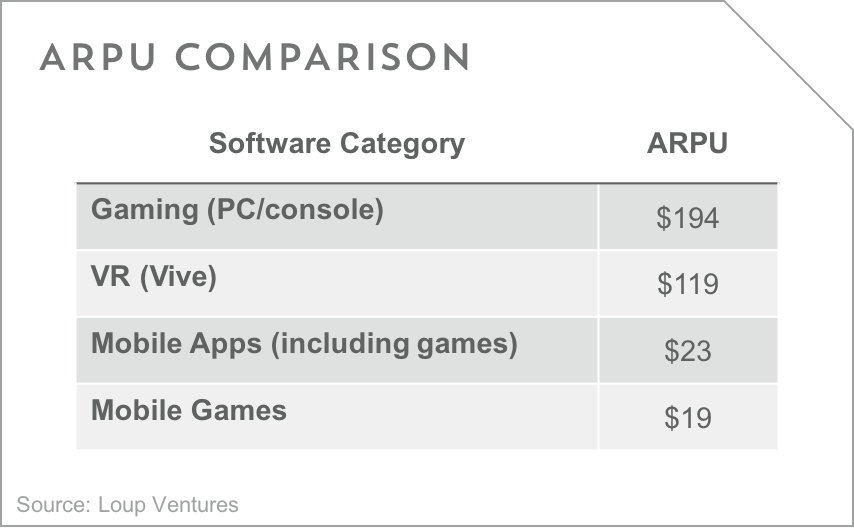While it’s still early, we think that VR gamers are already spending a significant amount on software. Based on an analysis of the top 100 VR-only Vive games on Steam, we estimate that about $35 million in software has been sold for the HTC Vive to date. We believe that HTC has sold over 300k Vives since the device launched in April 2016, which means that Vive owners have spent an average of about $119 on software over the past 10 months. Given an average sale price of ~$15.50 for the top VR games on Steam, this means Vive users are buying about 7 or 8 games on average. We looked at VR-only software for our analysis, which requires a VR device for its use, and excluded software that is PC based with additional VR content. In our view, VR-only software sales is the best indicator of what people are truly spending on VR. We also excluded Oculus Rift software sold on Steam in this analysis.
The vast majority of paid software available for the Vive is gaming related, thus we believe gaming is the best way to contextualize Vive ARPU. Note that these comparative ARPU numbers are for a full 12 months vs our Vive estimate over 10 months. In 2016, we estimate that total gaming software revenue for PCs and consoles (excluding mobile games) was about $33 billion. We believe there are about 170 million PC/console gamers worldwide, so gaming software ARPU is about $194 per year. For comparison, we believe that the mobile apps market, including gaming and non-gaming software, was worth $50 billion in 2016. With 2.1 billion smartphone users, mobile app ARPU is $23 per year. Finally, we note that mobile games made up the vast majority of mobile app sales, representing $42 billion in sales in 2016.

Since today’s high-end VR users are very early adopters, they are likely spending more than mainstream users would, despite limited software titles on the market. There are just over 1,000 VR-only titles on Steam vs over 27,000 titles on the store in total. Longer term, both the number of high-end VR users and ARPU will grow, driven by better, cheaper hardware and better titles respectively. We expect that VR ARPU will ultimately exceed that of traditional gaming, given richer games and other content experiences. As VR evolves beyond a purely digital solution, we believe that entire industries could be transformed, like travel and vice. That is why we think VR has the long-term potential to be more transformative to the human experience than AR.
Disclaimer: We actively write about the themes in which we invest: artificial intelligence, robotics, virtual reality, and augmented reality. From time to time, we will write about companies that are in our portfolio. Content on this site including opinions on specific themes in technology, market estimates, and estimates and commentary regarding publicly traded or private companies is not intended for use in making investment decisions. We hold no obligation to update any of our projections. We express no warranties about any estimates or opinions we make.